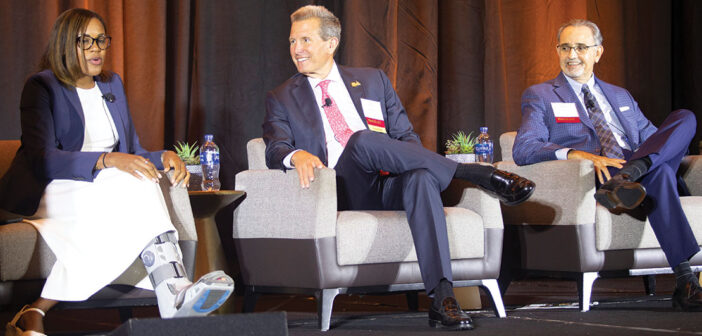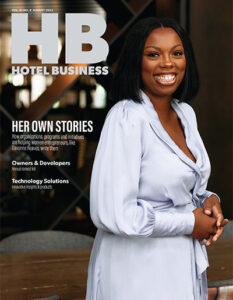At NABHOOD’s 26th Annual International African American Hotel Ownership & Investment Summit & Trade Show held last month at the Hilton Miami Airport Blue Lagoon hotel, the topics top of mind for attendees and panelists were the recovery, inflation and how to encourage young people to start a career path in the industry.
Inside the International Ballroom on the second day of the summit, Geoff Ballotti, president/CEO, Wyndham Hotels & Resorts, and Frank Nardozza, chairman/CEO, REH Capital Partners LLC, took the stage for the “CEO Executive Forum — A View From the Top” with moderator Jeanelle Johnson, principal/lead client partner, PwC.
Following the news the day before that inflation increased to 9.1% in June, Nardozza told the audience that it had been just as bad when he began his career in the 1970s.
“I can think back to when I started my career in the ’70s and by 1979, the inflation rate was at least 9%, if not more,” he said. “Interest rates to do a hotel deal were 18%. Debt financing was 18%. So, we’re in child’s play right now based on what it was like then.”
He added that he believes labor and interest rates are the two headwinds that are going to impact the business the most. However, “by and large, there are tons of opportunity out there and a lot of capital: I refer to it as the ‘Wall of Capital,’” he said. “The challenge is how to tap that wall of capital. But, it’s really: How do you educate yourself to be able to present the deal to the wall of capital? How do you know what are the hot points for those investors and those sources of capital? So, it’s all about education on how to tap into the opportunities and do it in a way that you can articulate why they should trust in you, why they should invest in you and why your deal’s a good deal. That’s really important—the education process of how to present the deal to those sources.”
Before the CEO session, Paul Cash, general counsel/corporate secretary/chief compliance officer, Wyndham Hotels & Resorts, told the audience about Wyndham’s new BOLD initiative for advancing black owners & lodging developers on the path to hotel ownership, which launched the day before. Johnson asked Ballotti why diversity, equity and inclusion (DE&I) is so important to him.
“It’s all about our culture [at Wyndham],” he said. “I believe people never quit a company because of of the company. They quit a company because of the culture. They quit a company because of their boss. They quit a company because they don’t believe. I’m asked all the time, ‘Why did I leave the company I left [before Wyndham], and why did you join the company?’ It was about the culture, and it was about the leadership that embraces something that is so core and fundamental to our culture and to attracting the talent and retaining the talent.”
Both executives moved to the topic of education, specifically educating young people about the benefits of a hospitality career.
“We talk about this all the time—we all have a responsibility of [telling people]why this is such a great industry—which could take you from a dishwasher to a senior executive of any company,” said Ballotti. “But, people need to be given that resource, and that starts with education.”
Nardozza, who serves in a number of capacities at Florida State University, brought up the school’s Center for Academic Retention and Enhancement (CARE), which provides preparation, orientation and academic support programming for students who are among the first in their family to attend college and may face unique challenges at the university because of educational or economic circumstances.
“Almost every semester, I take on one or two of those CARE students and help mentor them,” he said. “I’m particularly trying to attract them either to the real estate side or the hospitality side, and the first question they come to me with is, ‘I’m not sure if I want to own a hotel or develop a hotel, and if I don’t do that, I don’t want to be in housekeeping or working at the front desk of a hotel.’ I stop them in their tracks and then I hand out what I call the Nardozza cheat sheet.”
He continued, “In that cheat sheet, across the top, I have all the different types of companies that you could go into that are either in hospitality or touchpoints to hospitality. Some are consulting firms, some are asset management firms, some are insurance firms, some are investment banking firms, some are management companies and some are vendors to the industry. And, down the left side, I have all the different kinds of skill sets or positions—accounting, technology, investment, appraisal, development, management, marketing, timeshare, vacation ownership—and they look at me and say, ‘Wow, are you still talking about the real estate and hospitality industry?’ So, let’s talk to people from outside the industry that may be looking at different job opportunities, but those all exist in the hospitality industry.”
Johnson then asked the panelists about the operational changes that took place during the pandemic, and which will be permanent or temporary.
“I think a lot of the changes will become permanent,” said Ballotti. “We are asking people as we check in, ‘Would you like housekeeping,’ and I don’t know what the percentage is at this hotel, but I would assume it’s high of people not needing that nightly housekeeping. And, that is doing a lot to offset daily rate.”
He added that brand standards that were removed during the pandemic are likely permanent, such as full hot breakfasts at his company’s large economy hotels.
Nardozza pointed to the adoption of more and more technology solutions—which was at a high point during the pandemic—is “going to be our future,” adding, “Those of you that own hotels or are investing in hotels, if you’re not dealing with the technology side, you’re going to be so far behind the game.”


